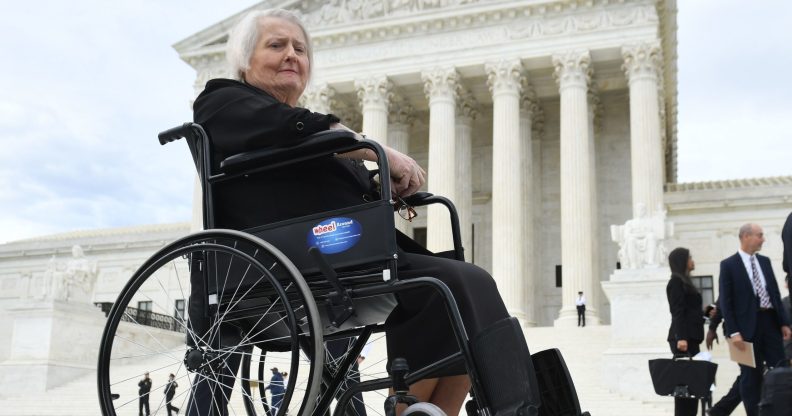Aimee Stephens died fighting for trans rights but was repeatedly deadnamed in obituaries. This is why that’s never, ever OK

Aimee Stephens outside the US Supreme Court in Washington, DC, October 8, 2019. (SAUL LOEB/AFP via Getty)
In memory of Aimee Stephens, the woman who brought the first-ever trans rights case to the Supreme Court, trans activist and ACLU lawyer Chase Strangio has explained why reporting deadnames is never OK.
Stephens, 58, had kidney disease and had been receiving hospice care at home in recent weeks. She died at home on May 12.
On the day of Stephens’ death, the New York Times, as well as other publications, ran an obituary which included her deadname. It later added an “Editor’s note” and removed her deadname.
Its not enough for us to have names and pronouns and expect them to be used – as any cis person can expect. No, we have to convince you it's suicide prevention, we have to point at the ever-growing numbers of dead trans ppl. And then we get called out for performative trauma!
— Charlie Knight [they/them] (@CKnightWrites) May 13, 2020
Strangio, a trans activist and staff attorney at the ACLU who represented Stephens, wrote a piece for NBC News about why “deadnaming is a way to shame trans people for who they are”.
He wrote: “To write about a woman who is trans and remind the reader of her deadname under the pretence that what she was called at birth is important to understanding who she is today actually evokes the image of a man for readers and contributes to the insidious social understanding that ‘this person claimed to be a woman but was really a man’.
“The ongoing understanding that our identities are not valid is what every trans person sees and hears whenever someone insists on referring to a trans person by using their deadname.”
He added: “Of course, no one will understand Aimee better by knowing the fact of her deadname.
“It is not relevant to who she was or how anyone will actually remember her — and including it in an obituary is a final act of disrespect so cruel that it undermines whatever respect was meant to come from memorialising a person in an obituary.
“If you want to know (or write) about someone and then go in search of their deadname or an old picture to use or disseminate, think long and hard about why that’s important to use.
“Your prurient curiosity shouldn’t get to trump our right to dignity and respect, and we are going to assume that your self-serving desire is more about hurting and exposing us trans people than accurately describing the people we are.”
Strangio said he commonly comes across people’s bizarre curiosity with his former name, or him “before”.
He said: “It does not represent who I am but rather a painful past that I worked hard to move beyond; it is as mean-spirited and useless for you to try to seek this information out as it would be for me to go in search of some painful experience of your childhood to define who you are for others.”
Aimee Stephens died before hearing her Supreme Court verdict.
Aimee Stephens brought what was one of a trio of LGBT+ cases the Supreme Court heard on October 8, which between them could determine whether millions of LGBT+ workers are protected under the US’s most powerful federal workplace anti-discrimination law, or whether it is legal to fire people on the basis of their identity.
In Stephens’ case, the Supreme Court looked at whether trans people are protected from employment discrimination, after she was fired from her funeral-home job two weeks after coming out as trans.
The Supreme Court is due to announce its verdict any day now – making her death all the more tragic.

